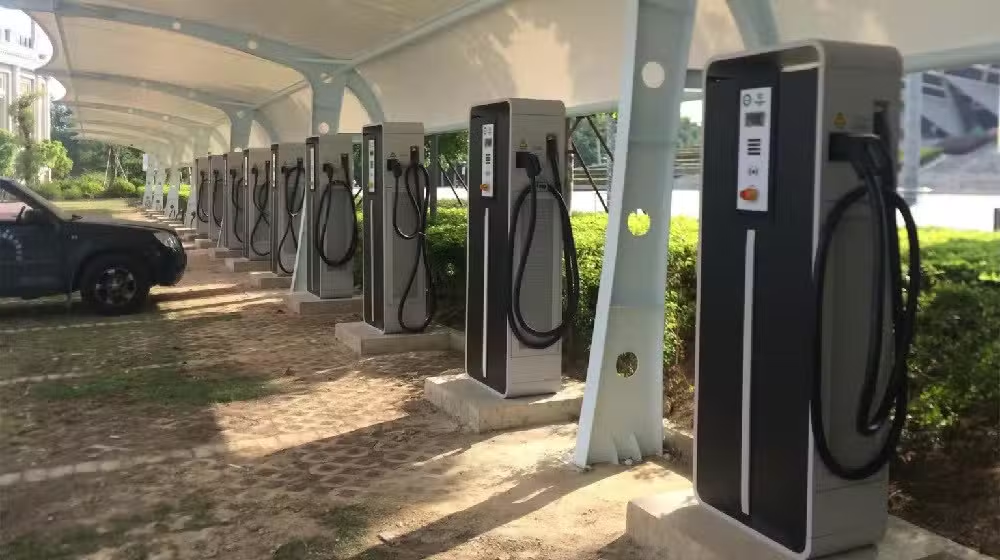Lahore, March 15: The Lahore High Court (LHC) has ordered government to make sure installation of electric vehicle (EV) charging points at all petrol pumps and fuel stations as part of its campaign against smog.
During a case hearing on climate issues and environmental pollution, Justice Shahid Karim conveyed displeasure over the shortage of proper policy steps to limit smog and wasting water.
The recent developments surrounding electric vehicles (EVs) in Pakistan reflect the government’s growing commitment to sustainable transportation and addressing environmental challenges, particularly smog and water wastage. Here’s an overview of the key actions and initiatives:
Lahore High Court (LHC) Directives on Smog Control and EV Infrastructure
EV Charging Stations at Fuel Stations:
- The Lahore High Court (LHC) has directed authorities to ensure that electric vehicle (EV) charging stations are installed at all fuel stations in Pakistan. This move is part of efforts to combat smog and promote greener alternatives.
Incentives for Electric Rickshaws:
- The LHC also emphasized the need for an incentive program to convert petrol-powered rickshaws to electric ones, promoting cleaner transport alternatives in urban areas.
Parking Facilities and Public-Private Partnerships:
- In addition, the court instructed authorities to create parking facilities under a public-private partnership, likely to support the growing number of electric vehicles and reduce congestion.
Government Initiatives to Boost EV Infrastructure
40 EV Charging Stations on Motorways:
- The government has approved the installation of 40 EV charging stations along Pakistan’s motorways. These stations will primarily focus on making electric two- and three-wheelers more accessible.
- The initial power rate for these stations is set at Rs. 39.75 per unit.
Financing Plan from Pakistan Banks Association (PBA):
- The Pakistan Banks Association (PBA), led by Zafar Masud, proposed a financing plan to support EV adoption. Banks are encouraged to offer loans at a rate of Kibor plus 3%, with recommendations to cap it at Kibor plus 2.5%.
- A debt-to-equity ratio of 70:30 is suggested, aligning with the guidelines from the State Bank of Pakistan (SBP). The Industries Ministry has also pushed for including insurance coverage for EVs, especially for battery theft.
EV Charging Station Locations:
- A working group will identify the locations for these charging stations, with input from various ministries, including Communication, Power, Petroleum, and the Federal Board of Revenue.
- The National Highway Authority (NHA) has already marked service areas every 120 km from Peshawar to Karachi as possible sites for these stations.
- Oil marketing companies (OMCs) have expressed willingness to provide power connections for these stations, with plans to begin construction within three months.
Long-Term Government Goals for EV Infrastructure
10,000 EV Charging Stations by 2030:
- Pakistan’s government has set an ambitious target of 10,000 EV charging stations by 2030 as part of the country’s commitment to reducing fuel dependency, lowering carbon emissions, and promoting cleaner transportation alternatives.
Second Electric Vehicle Policy:
- A new EV policy is expected by November 30, 2024, which will outline a comprehensive framework for EV infrastructure development, manufacturing incentives, and consumer benefits to stimulate further growth in the EV sector.
Private Sector Role and Investment
- Private Sector Collaboration:
- The private sector is playing a significant role in enhancing Pakistan’s EV charging infrastructure.
- Both domestic and international companies are investing in the EV market and partnering with the government to develop a robust charging network.
- Investments are focused on creating fast-charging stations, particularly catering to both passenger vehicles and commercial fleets.
Pakistan is making considerable strides towards the widespread adoption of electric vehicles (EVs), with a focus on expanding charging infrastructure and promoting eco-friendly transport solutions.
The collaboration between the government, banks, and the private sector is essential to ensuring that the EV ecosystem in Pakistan continues to grow sustainably.
The LHC’s directives and government targets will likely accelerate the transition to a cleaner, greener, and more energy-efficient transportation system in the country.









